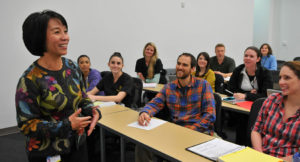Socratic Debriefing and Mentoring in Nursing Education
Socratic Method
• Based on the principles & techniques of Socrates, the ancient model teacher
• Socratic method is based in care for the learners – nurturing-by-challenging
• Socratic method is learner-centered and improves critical thinking and clinical judgment
• Socrates saw himself as a gadfly: prodded his students to push past false assumptions and fuzzy thinking
• Socrates saw himself as a midwife: helped students “deliver” fruitful ideas by reflecting on their thinking
• Techniques: Open-ended questions, examples as test cases, dialogue, learner self-reflection
Socratic Debriefing in the Nursing Classroom
• The NLN Board of Governors called for debriefing across the curriculum: “it is critical for nurse educators to have: a chosen theory-based method; formal training; and on-going assessment of competence. At their core all methods must have active reflection and a learner-centered perspective” (2015, p. 5).
• Former president of NLN Bavier argued that debriefing is key to nurses developing critical thinking and clinical judgment. “Debriefing may be the modern day version of the Socratic method, one that fits today’s knowledge boom and time pressures while fostering the basic why of our efforts – the development of critical thinkers” (Bavier, 2016, p. 1).
• Nurse educators would benefit from understanding the theory and principles of Socratic method. Even in programs that purport to use Socratic approaches, faculty are often not trained or assessed in the theory or techniques of Socratic questioning (Fey & Jenkins, 2015).
• Socratic debriefing is effective in small groups, large classes, lab and clinical conferences, and even one-on-one. Even small doses of it – five minutes here and there in a class – can have a significant impact on learning and retention.
Socratic Mentoring of New Graduate Nurses
• New graduate nurses (NGNs) are often unprepared to apply knowledge from their academic program as they begin clinical practice
• Socratic mentoring helps NGNs think critically and develop skills for lifelong learning and self-reflection, and learn to find answers themselves, develop clinical judgment, independence
• Nurse preceptors who have implemented Socratic mentoring have found:
o Dialogue helped them assess status of clinical judgment in NGN
o Even in stressful, busy moments there can be time for dialogue and reflection
o Saw their NGNs learning, retaining, reflecting on own practice, growing in confidence, increasing ability to prioritize, developing clinical judgment
o The preceptor-NGN relationship was strengthened through the dialogue
o Improved mentoring relationship: NGNs realized that preceptors “letting them struggle” and challenging NGNs with questions came from care and a desire for NGN to learn and grow
o Preceptors even found the Socratic dialogue helped their own reflection and confidence
For further information on implementing Socratic methods in classroom or hospital settings, contact:
Christine Sorrell Dinkins, PhD
Curriculum Designer and Trainer in Socratic Mentoring and Debriefing
dinkinscs@wofford.edu; 864-597-4590
Sources:
Bavier, A. R. (2016). Education’s why: Debriefing as how. Nursing Education Perspectives, 37(1), 1.
Dinkins, C.S. (2015) Socratic Pedagogy: Teaching Students to Think Like Nurses. In Expert Clinician to Novice Nurse Educator. J.M. Sorrell and P. Cangelosi, eds. Springer, 2015.
Fey, M. K. & Jenkins, L. S. (2015). Debriefing Practices in Nursing Education Programs: Results from a National Study. Nursing Education Perspectives, 36(6), 361-366. doi: 10.5480/14-1520
NLN Board of Governors (2015). Debriefing Across the Curriculum: A living document from the National League for Nursing. Retrieved from http://www.nln.org/docs/default-source/about/nln-vision-series-(position-statements)/nln-vision-debriefing-across-the-curriculum.pdf



